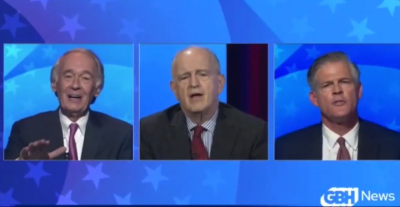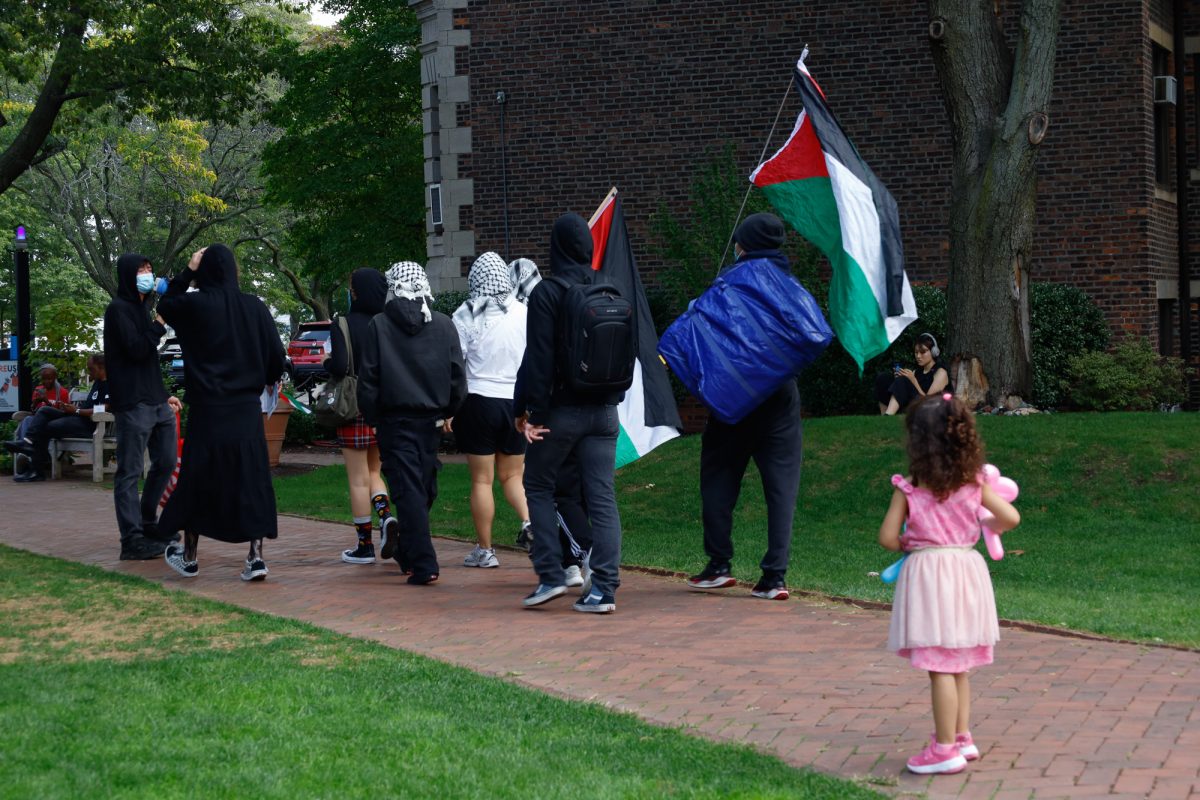Incumbent Democratic U.S. Sen. Ed Markey and Republican nominee Kevin O’Connor faced off in their first and only debate Monday evening.

Markey, who recently won his primary race against Rep. Joe Kennedy III, will now compete with a new opponent — O’Connor — for a seat in the Senate.
The two candidates sparred on various issues during the hour-long debate, including COVID-19 policies, the Green New Deal, Medicare for All and adding justices to the U.S. Supreme Court.
The debate began with questions regarding COVID-19 and whether the country should adopt a national mask mandate.
O’Connor said he doesn’t support a mask mandate and that, instead, people should listen to public health experts and decide based on the situation they’re in. Markey said he supports an enforced mask mandate.
“I think it’s consistent with all the public health guidelines that [Anthony] Fauci and public health physicians all across the country have been advising us to abide by,” Markey said. “Masks are less for your own heath than to protect other people.”
In regard to reopening the country, O’Connor said he has seen the devastating effects of shutdowns firsthand through his two primary-school-aged children’s remote learning experiences, and is in favor of reopening.
“The reality is that we can be both safe and open our economy and open our schools,” O’Connor said.
Markey supports giving Americans $2,000 every month, retroactive to March, to combat the effects of the pandemic. To pay for this, he said he would repeal President Donald Trump’s tax cuts.
“We can use those trillions of dollars to take care of ordinary American families who are suffering right now,” Markey said. “We have an unemployment rate in Massachusetts which is in double digits. It’s the worst since the Great Depression.”
O’Connor criticized Markey’s proposal, referring to it as a “free-lunch” program.
“Someone said to me recently, ‘There’s nothing more expensive than a free lunch,’” O’Connor said. “Ed Markey, throughout this campaign, has proposed these ‘free-lunch’ programs that are totally unaffordable, that will bankrupt future generations, and they are inexcusable.”
After debating on COVID-19 issues, the candidates moved on to the Supreme Court.
Markey said he disagreed with the Republican Party trying to confirm a Supreme Court nomination so close to Nov. 3 after having blocked former President Barack Obama’s nominee, Merrick Garland, during an election year.
“The Republicans are trying to steamroll through a nominee right before an election … in order to have someone on the Supreme Court who would be able to begin to hear the repeal of the Affordable Care Act,” Markey said. “In addition to that, they would be able to begin the process of rolling back Roe v. Wade.”
O’Connor said Supreme Court nominee Amy Coney Barrett is “extremely well qualified,” and that her nomination should be viewed not in the context of the present, but of the future.
“We don’t know what these Supreme Court justices will be deciding 10, 20 years from now,” O’Connor said. “We can’t have litmus tests. What we need are the best people, we need bright people, people of character who have lived responsibly.”
The candidates then debated on Medicare for All, a policy Markey supports.
Markey’s health care position differs from presidential nominee Joe Biden’s — as O’Connor pointed out — but Markey said he believes that keeping the Affordable Care Act from being “eviscerated” by Republicans is a step in the right direction to improving America’s health care system.
“Right now, we have a health care system in America that is a sick-care system,” Markey said. “Because of coronavirus, because of this economic recession, we’re seeing tens of millions of additional Americans losing their health care.”
O’Connor said he is not in favor of the Affordable Care Act, but instead wants America to adopt a system of health care similar to what Massachusetts currently has.
“Every state can adopt [our system],” O’Connor said. “It’s a great model and we have great coverage.”
The candidates went on to discuss racial issues, including systemic racism in the justice system.
O’Connor said he believes racism exists societally in the United States, but is unclear on its role systemically.
“I don’t know what systemic racism means. There’s certainly racism in America, and that’s included within the justice system,” O’Connor said. “I think there are certainly biases, historically, that have existed, and I believe there’s racism not just in the justice system but throughout our society.”
Markey said he has fought against systemic racism in the past, referencing his E-Rate program, which provides internet access to children who need it, and the Green New Deal. He said the current correctional system demonstrates how the current system disproportionately harms certain races.
“We’re 25 percent of the prisoners in the world,” Markey said. “We’re only 5 percent of the world’s population … There is systemic racism built throughout our entire criminal justice system.”
Among the final topics the two debated was the Green New Deal, a proposal that Markey sponsored alongside Rep. Alexandria Ocasio-Cortez.
O’Connor said Biden thinks the Green New Deal is “completely unrealistic” and that Markey’s ideals are too extreme, even by Democratic Party standards. He said he prefers a more moderate approach.
“There’s a good plan right now that’s been put out by the American Conservation Coalition. It strives for carbon neutrality by 2050,” O’Connor said. “The American Conservation Coalition’s plan is a bipartisan plan. If I have to work across the line to get it done, I’ll work across the line.”
O’Connor said he would be a “pro-environment senator,” but that he thinks the Green New Deal is too extreme.
“I have four kids. I’m worried about the future. I’m deeply concerned,” O’Connor said. “But Sen. Markey’s Green New Deal, that extreme program, is nothing but posturing.”
Markey said he supports Biden, regardless of whether Biden supports Markey’s policies.
“I support the Green New Deal, and I support Joe Biden,” Markey said. “Joe Biden has moved a long way over the last year. I’m going to continue to advocate for the Green New Deal so that we can implement a plan that saves all of creation while engaging in massive job creation.”


















































































































